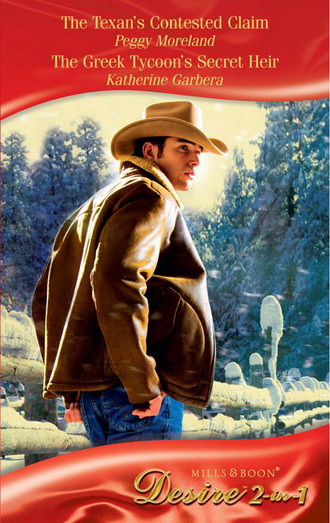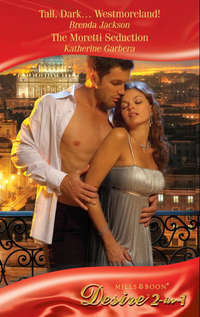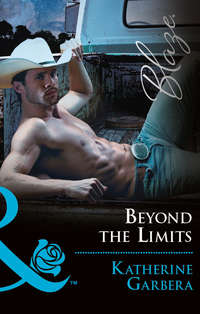
Полная версия
The Texan's Contested Claim
“I could be a call girl,” Ali said defensively. “Not that I ever would, but I could.”
“Are you kidding me?” Traci said in dismay. “If you had to depend on turning tricks for your support, you’d starve to death within a week.”
Grimacing, Ali yanked open the oven door. “Well, thanks for that vote of confidence,” she groused, as she shoved a basket of sopaipillas inside to keep warm.
Traci managed to snag a pastry before Ali could close the oven door. “I’m not saying you couldn’t attract a man,” she said, as she spooned honey into the pastry’s puffed center. “But there’s more to being a call girl than wearing skimpy clothes and flashing cleavage.”
Ali gave her a bland look. “Oh, and I suppose you’re an expert on the subject.”
“I watch enough cop shows to teach a course. And let me tell you,” she went on, warming to the subject, “the hookers they haul off the streets aren’t particular about who they have sex with. They can’t afford to be. You, on the other hand, would turn up your nose at the slightest physical flaw.”
Ali’s jaw dropped. “Are you saying I’m a sexual snob?”
Traci caught a dribble of honey on the tip of her finger and brought it to her mouth. “Need I remind you of Richard?”
Ali shuddered at the mention of the C.P.A. she’d briefly dated. “Please. Just thinking about his clammy hands and slobbery kisses makes me want to hurl.”
“And you think the men call girls entertain are Brad Pitt lookalikes?”
“Okay, okay,” Ali grumbled. “You made your point.”
Traci smiled smugly. “I so love it when I’m right.”
“Shh,” Ali hissed, and listened, sure that she’d heard footsteps in the hallway above.
“He’s coming,” she whispered, and grabbed Traci by the elbow and hustled her toward the back door.
“Hey,” Traci cried, juggling her sopaipilla to keep from dropping it. “Who said I was leaving? I want to meet your mystery zillionaire guest.”
Ali opened the back door. “He’s not my zillionaire, and you can’t meet him.”
“Why not?”
She gave Traci a nudge over the threshold. “I already told you. He doesn’t want anyone to know he’s here.” Before Traci could demand to stay, she shut the door in her face and turned the lock, just in case she tried sneaking back in.
With Traci dealt with, she headed for the breakfast room where she found Garrett standing at the buffet, pouring himself a cup of coffee. He was dressed much as he had been the day before—jeans and a black pullover sweater, a casual look she found extremely sexy.
Too bad his personality kills his appeal, she thought with regret.
Forcing a smile, she crossed to greet him. “Good morning. Did you sleep well?”
He spared her a glance, before returning the carafe to the hot plate. “Not particularly.”
She kept her smile in place, refusing to let his sour disposition infect her. “Well, hopefully you’ll rest better tonight.”
He raised the cup to his lips and met her gaze over its rim. “That remains to be seen.”
Those eyes again, she thought. What was it about them that was so mesmerizing? It certainly wasn’t their color. Brown eyes were as common as house flies in Texas. So why were his so compelling?
Feeling herself being drawn deeper and deeper into their dark depths, she tore her gaze away and made a beeline for the kitchen.
“Have a seat at the table,” she called over her shoulder. “I’ll be right back with your breakfast.”
Once out of his sight, she grabbed a plate and gave herself a stern lecture, as she filled it with food. He’s nothing special, she told herself. Good-looking men were a dime a dozen in Austin. And so what if he was rich as sin? She’d never considered money a positive attribute, especially in a man. All the rich guys she’d ever known were pompous jackasses, who used their money to feed their egos and need for power. Cars, boats, homes. The more attention a “thing” drew to him, the greater its appeal.
Nope, she mentally confirmed, as she pulled the basket of sopaipillas from the oven. Garrett Miller was nothing special and definitely not a man she’d want to become involved with.
Adding the basket to the tray, she returned to the breakfast room, feeling much more in control.
“I hope you’re hungry,” she said, as she transferred dishes from the tray. “Huevos Rancheros,” she said, identifying each food item as she arranged it in front of him. “Roasted new potatoes, fresh fruit with a light poppyseed dressing and sopaipillas with butter and honey.”
Tucking the tray beneath her arm, she reached for the carafe. “If you need anything,” she said after topping off his coffee, “I’ll be in the kitchen.”
She waited until the swinging door closed behind her, then set aside the tray and headed straight for the sink, anxious to put the kitchen back in order. Elbow deep in suds, washing the pans she’d dirtied while cooking, she heard the door open behind her and glanced over her shoulder. Her eyes shot wide when she saw Garrett entering, carrying his plate and cup of coffee.
“Is something wrong with the food?” she asked in alarm.
“No. I thought I’d eat in here with you.”
She blinked in surprise. “But—but guests don’t eat in the kitchen. They take their meals in the breakfast room.”
He set his cup and plate on the island and slid onto a stool. “This one doesn’t,” he said, and opened his napkin over his lap.
She considered insisting he return to the breakfast room, then turned back to the sink with a sigh, deciding the guy had paid for the right to eat wherever he wanted.
Thinking she should try to make conversation with him, she asked, “Do you have plans for the day?”
“Nothing specific. I thought I’d take a drive later and familiarize myself with the city.”
“Have you ever been to Austin before?”
“A couple of times on business, but I was in meetings and saw very little of the city.”
She rinsed the soap from the pan she’d washed and set it on the drainboard. “That’s a shame. There’s a lot to do and see in Austin.”
“Such as…?”
She wrung out the dishcloth and moved to the island to wipe down the surface. “Well, there’s Sixth Street,” she said, “which is a little bit like Bourbon Street in New Orleans’ French Quarter. You’ll find everything there from tattoo parlors to jazz clubs. It gets pretty crazy on weekends. Lots of people on the street, drinking and partying.
“The State Capitol is a must-see,” she went on. “Fabulous architecture and a tremendous view of the city from the top. And if you’re into history, Austin is the home of the Lyndon Baines Johnson Library, as well as the Bob Bullock Museum.”
“Have you lived here all your life?” he asked.
She chuckled, amused that he would mistake her for a native. “No. I’d think my northern accent would give me away.”
“Northern?” he repeated, then shook his head and speared a plump strawberry with his fork. “Trust me. Whatever accent you had was lost to a Texas twang long ago.”
“Really?” she said, considering that the ultimate compliment.
“Really. Throw in a couple more y’alls and you could pass for Sue Ellen from the Dallas TV series.”
“Wow. That really takes me back. I watched that show when I was a kid. Sue Ellen, J.R., Bobby….” Hiding a smile, she shook her head. “The Ewing family was so dysfunctional, they made mine look like the Waltons.” Reaching the end of the island where the coffeemaker sat, she lifted the carafe. “More coffee?”
“None for me.” He wiped his mouth with his napkin, then set it beside his plate. “You’ve mentioned your family several times and not necessarily in a good light.”
She shrugged. “Just being honest. My parents are strange people.” She carried the carafe to the sink. “If you have any food preferences,” she said, changing the subject, “let me know. I try to accommodate my guests’ tastes whenever I can.”
When he didn’t reply, she glanced over her shoulder and found him frowning at her back. “Is something wrong?”
He shook his head. “No. I…I was just wondering if you’d have time to drive me around today.”
Her stomach clenched at the thought of being trapped in a car with him all day. “If you’re worried about getting lost, I can provide you with plenty of maps.”
“I don’t need a map. It’s your opinion I want, as well as your knowledge of the area. You seem to know the city well and can probably offer me insight on things I wouldn’t think to ask.”
“I don’t know,” she said slowly, while trying to think of a plausible excuse to refuse him. “I’ve got a lot to do today. I finished boxing up all the Christmas decorations yesterday, but I still need to carry all the crates to the attic.”
“Tell you what,” he said. “If you’ll act as my tour guide for the day, I’ll help you haul the crates upstairs. And,” he added, as if sensing her reluctance, “I’ll compensate you for your time.”
“You’ll pay me?” she said in surprise.
“Yes.”
He named an amount that made her jaw drop. “That’s more than some people pay for a car!”
“I assure you I can afford it.” He lifted a brow. “So? Do we have a deal?”
“Well, yeah,” she said, then stuck out a hand, fearing he’d try to renege on the deal later. “In Texas, a man’s handshake is as good as his word.”
He took her hand. “Is it the same for a woman?”
The tingle started in the center of her palm and worked its way up her arm. Wondering what it was about him that spawned the sensation, she curled her fingers into a fist against her palm.
“Yeah,” she said, surprised by the breathy quality in her voice. “Same goes.”
If the computer industry ever bottomed-out and Garrett suddenly found himself in need of a job, he thought he might try his luck as a private investigator. He was getting pretty damn good at this clandestine stuff. Asking Ali to chauffeur him around Austin might have been spontaneous, but it was pure genius. Not only had he finessed a large block of time in which to learn more about her, he’d also finagled a way to check out her attic. He hadn’t expected to find the missing deed lying in plain sight up there—and he hadn’t—but he had familiarized himself with the attic’s layout, which would come in handy if Ali refused to relinquish her portion of the deed to him, and he was forced to search for it on his own.
He hoped it didn’t come to that. Lying was one thing. Stealing was quite another.
“Am I driving too fast?”
He glanced Ali’s way. “No. Why?”
“You were frowning.”
“Was I?” He turned his gaze to the roadway again. “Just thinking.”
“You must think all the time.”
“What makes you say that?”
“Because you’re always frowning.”
“Am I?” He considered the possibility a moment, then shrugged again. “I’ve never noticed.”
“Do you ever have happy thoughts? Things that would make you smile?”
“Like what?”
“I don’t know. A pleasant memory. Maybe a funny movie you’ve seen that makes you laugh when you think about it.”
“I don’t recall the last comedy I saw.”
She glanced his way. “Are you serious?”
“Why would I lie?”
Shaking her head, she turned her gaze back to the road. “So what do you do for grins?”
“I enjoy playing computer games.”
She spun a finger in the air. “Whoopee.”
“What do you do for fun?” he asked, neatly turning the tables on her.
“There’s very little I do that’s not fun. Going out to dinner or to the movies with friends. Working in my garden. Taking pictures.”
“Taking pictures doesn’t count. That’s a job.”
“Just because it’s a job doesn’t mean it can’t be fun.”
Realizing that she had unwittingly offered him the opportunity to probe into her life for that weakness he needed, he decided to take advantage of it. “If you enjoy photography so much, why have the bed-and-breakfast? Why not be a full-time photographer?”
“At one time, that was my plan. I was going to travel the world, taking pictures, then publish them as books.”
“An album of your personal travels?” he said, as if doubting there was a market for such a thing.
“It wouldn’t be personal,” she told him. “At least, not in the way you mean. The pictures would be of people, places and things that share a theme or tell a particular story.”
“What do you mean, ‘tell a story’?”
“Well, let’s say I wanted to do a photographic study of an Amish family,” she said. “I’d photograph them at work, at play, in their home, in their community, capturing their lives, as well as their lifestyle on film. The pictures would tell the story.”
“Isn’t that the same as theme?”
“In some ways, yes. But when I think of theme, I think in terms of a single topic. Take poverty for instance,” she said. “If I were to choose that as my theme, I might travel around, photographing examples of poverty in different parts of the country or even the world. Poverty would be obvious in all the pictures, but the people and the settings would be different.”
That she enjoyed photography was obvious in the enthusiasm in her voice, the light in her eyes. “And if you chose families as a theme, you’d photograph different families, not just one.”
“Score!” she cried and held up a hand to give him a high five.
Amused, he slapped her hand. “As interesting as all that is, it doesn’t explain why you’re running a bed-and-breakfast and not focusing on photography.”
“Long and depressing story,” she said, and slanted him a look. “Sure you want to hear it?”
He opened his hands. “I asked, didn’t I?”
“Oh, wait,” she said, straining to look at something up ahead. “There’s Callahan’s. Do you mind if we stop?”
“What’s Callahan’s?”
“A store. I need to pick up a bag of birdseed for my feeders.”
Though disappointed that the stop would interrupt what he hoped would be an enlightening view into her life, he shrugged, thinking he’d pick up on the conversation again later. “Fine with me.”
“Thanks. It’ll save me making a trip later.” She checked the rearview mirror for traffic, then changed lanes and turned into the parking lot. After shutting off the engine, she reached over the back seat for her tote. “Do you want to come in?”
He looked at the storefront, considering, then figured what the hell. There didn’t appear to be many customers. “I believe I do.”
As they entered the store, Ali nudged his arm. “Aren’t you going to take off your sunglasses?” she whispered.
He shook his head. “Someone might recognize me.”
With a roll of her eyes, she went in search of her birdseed. He watched her walk away and his gaze slid unerringly to the sway of her hips. Yeah, she was stacked, all right, he confirmed. He watched until she disappeared from sight, enjoying the view, then turned down an aisle to explore the store’s merchandise on his own.
The place reminded him of the general stores he’d seen in Western movies, carrying everything from horse tack to Western-style clothing. He paused beside a display of cowboy hats and, curious, plucked a black one from the rack. He snugged it over his head and leaned to check out his reflection in the mirror behind the counter.
“Looks good.”
He glanced over and saw Ali had joined him. Feeling foolish, he dragged off the hat. “I don’t wear hats.”
“Really? You should. Especially a cowboy hat. You look sexy in one.”
He gave her a doubtful look.
“Well, you do,” she insisted. “Sort of like a bad-ass gunslinger. You know. The kind who can empty a saloon by simply walking in the door.”
Hiding a smile, he ran a finger along the brim. “Maybe I should buy it and wear it to my next board meeting.”
“Couldn’t hurt.” She took the hat from him and placed it on his head again. She studied him a moment, and he’d swear he heard wheels begin to churn in her head.
“Come on,” she said and grabbed his hand. “If you’re going for the gunslinger look, you’re gonna need jeans and boots.”
He hung back. “I was kidding.”
She gave him an impatient tug. “I wasn’t. Besides, you know what they say. When in Rome…”
Garrett discovered the woman was a whirlwind when on a mission. Within minutes, she had him in a dressing room, trying on jeans, shirts, boots and what she referred to as a “duster,” which was nothing more than a long trench coat with a Western-style yoke and a slit up the back so that a man could sit in a saddle while wearing it.
“Aren’t you dressed yet?” she called impatiently from the other side of the door.
He hooked the silver belt buckle at his waist, then glanced up at his reflection in the mirror. He did a double take, startled by the change the style of clothing made to his appearance. “Yeah,” he said staring. “I’m dressed.”
“Well, come on out. I want to see.”
He plucked the black felt hat from the hook on the wall and snugged it over his head as he stepped out of the dressing room.
A flash went off, and he caught himself just short of diving for cover.
Ali slowly lowered her digital camera to stare. “Wow,” she murmured. “You don’t even look like the same guy.”
He scowled, embarrassed that, for a split second, he’d mistaken the flash of the camera for a gunshot.
“If I didn’t know better,” she went on, “I’d never guess you were Garrett Miller, zillionaire entrepreneur.”
“Zillionaire?” Shaking his head, he turned to study himself in the full-length mirror. “You know,” he said, growing thoughtful. “This getup might be just what I need to keep from being recognized.”
“Like I said,” Ali said, with a shrug, “when in Rome…” She reached to tear the price tag off his shirt.
He yanked his arm back. “What are you doing?”
She spun him around to rip the tag off the rear pocket of the jeans. “Taking off the price tags. Don’t worry,” she assured him as she gathered from the dressing room the clothes he’d worn into the store, as well as the stack of clothing he hadn’t tried on yet, “I’ll give them to the salesclerk, along with these other clothes. That way you can wear your new duds out of the store and not have to change again.”
Ali held the camera before her face with one hand, and directed Garrett with the other. “A little to the left. A little more. Stop! Perfect.” She clicked off a half-dozen or more shots, then dropped the camera to swing from her neck. “Now let’s try a few with you standing with one boot propped on the boulder.”
He dropped his hands to his hips in frustration. “I’m not a damn model, you know.”
“No,” she said patiently. “And I’m not a chauffeur, yet I’ve been driving you around all day like I was.”
“A duty you’re being well paid for,” he reminded her.
She wrinkled her nose. “Oh, yeah. Right. Tell you what,” she said. “Pose for a few more shots, and I’ll give you a full set of prints, no charge.”
“‘A few shots’ is all I agreed to when you talked me into this nonsense more than an hour ago.”
“Can I help it if you’re such a handsome model?”
“Flattery will get you nowhere,” he said dryly.
“Okay. How about this? You let me take a few more pictures, and I’ll chauffeur you around the whole month you’re in town.”
He frowned a moment, as if considering, then nodded. “All right. You’ve got yourself a deal.”
Grinning, she drew the camera before her face again. “Boot on the boulder,” she instructed. “Forearm braced on the knee. Now look off into the distance and make that face you make when you’re thinking really hard. Great!” she exclaimed, and clicked away. “Man, you should see this. The sun is setting just behind your left shoulder and creating perfect shadows on your face.
“Give me a forlorn look,” she said, continuing to click off shots. “You know. Like you’ve been running from the law for months, and you’re missing that pretty little saloon girl you met up in Dodge City.”
“A saloon girl in Dodge City?” He dropped his head back and laughed. “Damn, Ali, where do you get this stuff?”
The transformation laughter made to his face almost made her drop her camera, but she managed to hold on to it and keep clicking. “Part of the job,” she told him. “Just part of the job.”
Shaking his head, he dragged his foot from the boulder. “You should be a writer, not a photographer.” When he realized she was still taking pictures, he held up a hand to block her view. “Would you stop,” he complained. “You must’ve taken a hundred pictures or more.”
She reluctantly lowered the camera. “I’ll be lucky if a third are worth anything.”
He went stock-still. “You didn’t say anything about selling these pictures.”
“Would you lighten up?” she said, laughing. “I took the pictures for fun, not to sell. Kind of a souvenir for you of your trip to Texas.”
“Oh,” he said in relief. “Which reminds me,” he said, and plopped down on the boulder, stretched out his legs. “You were going to tell me why you’re running a bed-and-breakfast, rather than focusing on a career in photography.”
Gathering up her tote, she crossed to sit beside him. “Are you sure you want to hear this?” she asked, as she pulled her camera over her head. “It’s really boring.”
“I wouldn’t have asked, if I didn’t.”
With a shrug, she tucked the camera into her tote. “It goes back to when I dropped out of college during my junior year and moved to Austin.”
“Why did you drop out?”
“My parents come from a long line of doctors and they expected me to follow in their footsteps. Carry on the family tradition. That kind of thing.”
“And you didn’t want to?”
“Not even a little. I did try,” she said in her defense. “But I hated all the science courses I was required to take and my grades proved it. I tried to talk my parents into letting me change my major, but they wouldn’t listen. They kept saying I wasn’t applying myself. That being a doctor was an honorable occupation, a duty even. We argued about it all during Christmas break, and I finally told them that they couldn’t force me to become a doctor, that I was going to sign up for the courses I wanted to take.”
“And did you?”
She grimaced. “For all the good it did me. When they received the bill from the university for my spring tuition and saw what courses I’d signed up for, they refused to pay it. When that didn’t whip me into line, they closed the checking account they’d set up for me to pay my college expenses, which left me with no money and no way to pay for my housing, food. Nothing.”
“So how did you end up in Texas?”
“Claire Fleming. She and I met our freshman year in college and became best friends. She knew my parents had cut me off and how bummed I was. To cheer me up, she invited me to go to Austin with her to visit her grandmother. I had nothing better to do, so I tagged along.
“To make a long story a little shorter, the Vista belongs to Claire’s grandmother, Margaret Fleming. It was a wedding present from her first husband. Sadly he died after they’d been married only a few years. She remarried several years later to some oil guy and moved to Saudi Arabia, but she held on to the house. Said selling it would be like cutting out her heart.
“She came back to the States several times a year for month-long visits and always stayed at the house. As she got older, it became harder for her to travel and she wasn’t able to come as often. You can imagine what happened to the house. What the vandals didn’t destroy, varmints did. It was a mess. She’d always hoped that Claire would want the house someday, but Claire fell in love with an Aussie and was planning to move to Australia right after graduation, which she did, by the way. So the grandmother decided to make one final trip to Austin before selling the house. Claire was to meet her there and help her pack up what personal belongings she wanted to keep.
“What I didn’t know was that Claire and her grandmother had already discussed my situation, and they’d decided to offer the house to me.” She held up a hand. “And, yes, I know it sounds too good to be true. At the time, I thought so, too. But Mimi—that’s Claire’s grandmother—was dead serious. She really loved the house and didn’t want to sell it, and she definitely didn’t need the money. So she offered it to me. All she asked in return was that I take care of it and love it as much as she did.”









